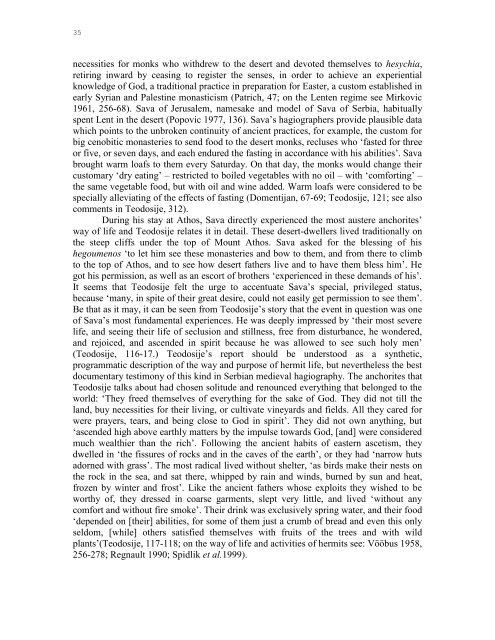You also want an ePaper? Increase the reach of your titles
YUMPU automatically turns print PDFs into web optimized ePapers that Google loves.
35<br />
necessities for monks who withdrew to the desert and devoted themselves to hesychia,<br />
retiring inward by ceasing to register the senses, in order to achieve an experiential<br />
knowledge of God, a traditional practice in preparation for Easter, a custom established in<br />
early Syrian and Palestine monasticism (Patrich, 47; on the Lenten regime see Mirkovic<br />
1961, 256-68). Sava of Jerusalem, namesake and model of Sava of Serbia, habitually<br />
spent Lent in the desert (Popovic 1977, 136). Sava‟s hagiographers provide plausible data<br />
which points to the unbroken continuity of ancient practices, for example, the custom for<br />
big cenobitic monasteries to send food to the desert monks, recluses who „fasted for three<br />
or five, or seven days, and each endured the fasting in accordance with his abilities‟. Sava<br />
brought warm loafs to them every Saturday. On that day, the monks would change their<br />
customary „dry eating‟ – restricted to boiled vegetables with no oil – with „comforting‟ –<br />
the same vegetable food, but with oil and wine added. Warm loafs were considered to be<br />
specially alleviating of the effects of fasting (Domentijan, 67-69; Teodosije, 121; see also<br />
comments in Teodosije, 312).<br />
During his stay at Athos, Sava directly experienced the most austere anchorites‟<br />
way of life and Teodosije relates it in detail. These desert-dwellers lived traditionally on<br />
the steep cliffs under the top of Mount Athos. Sava asked for the blessing of his<br />
hegoumenos „to let him see these monasteries and bow to them, and from there to climb<br />
to the top of Athos, and to see how desert fathers live and to have them bless him‟. He<br />
got his permission, as well as an escort of brothers „experienced in these demands of his‟.<br />
It seems that Teodosije felt the urge to accentuate Sava‟s special, privileged status,<br />
because „many, in spite of their great desire, could not easily get permission to see them‟.<br />
Be that as it may, it can be seen from Teodosije‟s story that the event in question was one<br />
of Sava‟s most fundamental experiences. He was deeply impressed by „their most severe<br />
life, and seeing their life of seclusion and stillness, free from disturbance, he wondered,<br />
and rejoiced, and ascended in spirit because he was allowed to see such holy men‟<br />
(Teodosije, 116-17.) Teodosije‟s report should be understood as a synthetic,<br />
programmatic description of the way and purpose of hermit life, but nevertheless the best<br />
documentary testimony of this kind in Serbian medieval hagiography. The anchorites that<br />
Teodosije talks about had chosen solitude and renounced everything that belonged to the<br />
world: „They freed themselves of everything for the sake of God. They did not till the<br />
land, buy necessities for their living, or cultivate vineyards and fields. All they cared for<br />
were prayers, tears, and being close to God in spirit‟. They did not own anything, but<br />
„ascended high above earthly matters by the impulse towards God, [and] were considered<br />
much wealthier than the rich‟. Following the ancient habits of eastern ascetism, they<br />
dwelled in „the fissures of rocks and in the caves of the earth‟, or they had „narrow huts<br />
adorned with grass‟. The most radical lived without shelter, „as birds make their nests on<br />
the rock in the sea, and sat there, whipped by rain and winds, burned by sun and heat,<br />
frozen by winter and frost‟. Like the ancient fathers whose exploits they wished to be<br />
worthy of, they dressed in coarse garments, slept very little, and lived „without any<br />
comfort and without fire smoke‟. Their drink was exclusively spring water, and their food<br />
„depended on [their] abilities, for some of them just a crumb of bread and even this only<br />
seldom, [while] others satisfied themselves with fruits of the trees and with wild<br />
plants‟(Teodosije, 117-118; on the way of life and activities of hermits see: Vööbus 1958,<br />
256-278; Regnault 1990; Spidlik et al.1999).


